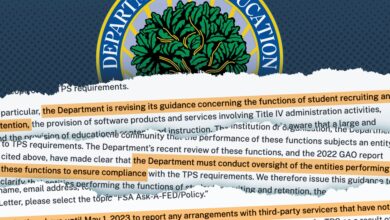Is Higher Ed a Public Good or a Public Threat?

The cost-benefit analysis, she says, just got easier. This year, tuition and fees have been cut to zero at all of the state’s 29 public and tribal colleges, for most New Mexicans attending full or part time, regardless of their income. That’s true for recent high-school graduates working toward four-year degrees, as well as time-crunched working parents seeking trade certificates.
In Lujan Grisham’s view, higher education is a public good that should be available to all, one that delivers not only a positive return on investment, but a way to transform lives. It’s something worth investing in.
Meanwhile, Florida’s Republican governor, Ron DeSantis, has a very different message about college. Professors, he contends, are “indoctrinating” students with liberal beliefs, creating an “intellectually repressive” atmosphere on college campuses.
To combat that, he signed a law last year that requires public colleges to distribute annual surveys, developed by the state’s Board of Education, that measure intellectual freedom and viewpoint diversity among faculty, staff, and students. He’s hinted that universities that score poorly may expect budget cuts.
Governor DeSantis also signed legislation this year that could lead to mandatory post-tenure review for faculty members. He and top Republicans have championed the “Stop WOKE Act,” which prevents colleges from teaching critical race theory or compelling anyone to believe, among other things, “that an individual … bears personal responsibility for and must feel guilt, anguish, or other forms of psychological distress because of actions committed in the past by other members of the same race, color, sex or national origin.”
Higher education, in DeSantis’s campaign playbook, is a threat that Floridians need to be protected from. It’s the state’s job to do that, by radically reshaping colleges.
Lujan Grisham and DeSantis have one thing in common: They’re both expected to win re-election in November. The fact that two such divergent approaches can appeal to voters in different states reveals how polarized the country has become on the subject of higher education.
As the nation’s elected officials emerge from a bruising midterm election cycle, their approaches to higher-education policy will be shaped by how they answer the question: Is higher education delivering on its promise?
For Stephanie Rodriguez, New Mexico’s secretary of higher education, the answer is unequivocally yes. “Over the last 10 years, more than 10,000 jobs have opened with annual salaries averaging $90,000, but they require postsecondary degrees,” Rodriguez said. “If we’re not meeting students halfway, how do we expect to fill those jobs?” With free tuition, she said, “we’re changing the narrative. Higher education does pay off. The numbers speak for themselves.”
For years, declining state support and escalating tuition put the squeeze on New Mexican families, hitting disadvantaged students hardest. Improving college access has been a centerpiece of Lujan Grisham’s platform as governor. She’s had a staunch ally and longtime adviser in Rodriguez, whose personal story reflects that of many New Mexicans who have overcome adversity to attend college.

Tommie Morelos, TTUHSC El Paso
The daughter of Mexican immigrants, the education secretary was the first of her siblings to earn a college degree. She points out that 60 percent of New Mexico’s population is Hispanic or Native American, and less than half of the state’s population has a postsecondary degree, certificate, or training beyond high school. The average age of college students is 26.
Rodriguez herself struggled to finish high school, when her family went through a period of turmoil and her grades plummeted. One-on-one help from an adult-education program like the ones she now champions allowed her to enroll in the University of New Mexico, where she received bachelor’s and master’s degrees. She has worked with and been a key adviser to the governor since 2014, when Lujan Grisham was a representative in the U.S. Congress.
Rodriguez helped the governor expand and streamline the state’s existing scholarship programs into an Opportunity Scholarship that’s considered one of the nation’s most expansive free-college programs. Among the few requirements are that students take at least six credit hours per semester and maintain a 2.5 grade-point average. The program is expected to cost just over $100 million a year, according to a legislative analysis.
We’re changing the narrative. Higher education does pay off. The numbers speak for themselves.
So far, about 34,000 students, who are automatically signed up when they enroll in college, have benefited this semester, a state Education Department spokeswoman said. That’s helped fuel a 3-percent increase in public four-year college enrollment this year, along with an enrollment increase of more than 6 percent for community colleges.
The program was funded this year with $63 million coming from federal pandemic-relief funds and $12 million from state general funds. That, along with a scholarship fund balance of nearly $25 million, should cover the first year, but additional money will need to be approved in future years.

Bill Clark/CQ-Roll Call, Inc via Getty Images
Critics, including Lujan Grisham’s Republican challenger, Mark Ronchetti, have questioned whether the program is sustainable since it relied on pandemic-relief funds, as well as oil and gas revenues, which can fluctuate. New Mexico has historically relied heavily on the energy sector of its economy to pay for state programs, and that sector is currently booming. Finding a sustainable source of money, along with diversifying the state’s economy, are among the governor’s priorities, said Delaney Corcoran, a campaign spokeswoman.
The free-college program attracted bipartisan support by appealing to broad cross-sections of the population and work force.
“We’re not blind to the fact that a lot of the industries that thrive here don’t necessarily rely on those typical four-year degrees,” Corcoran said. New Mexico’s program “is not just for those getting their bachelor’s degrees, but also for someone who wants to train to work in a barber shop or dental office — areas you might not think of at first when you think about higher education.”
His harshest attacks, however, have been on what he sees as the bias against conservatives, a complaint echoed by his education department when asked about the need for a viewpoint-diversity survey.
“Our state public colleges and universities should be institutions that teach students how to think, not what to think,” Alex Lanfranconi, a spokesman for the Florida Department of Education, said in a statement emailed to The Chronicle. “The college campus should be a place to freely discuss ideas, weigh them against one another, and draw informed conclusions. Recently, we discovered our public colleges and universities could do better to safeguard these freedoms for students.”

SOPA Images/LightRocket via Getty Images
Ernie Sampera, a junior political-science major at Florida State University, serves as vice president of the university’s College Republicans, a group with a core membership of about 30 students. In a paper for a course on the American presidency, he has to grade President Biden and former President Trump on their leadership qualities, he said.
“I’m wondering, do I write what the professor wants me to write, or what I actually think?” he said. “If I grade Trump as a B-plus and Biden as a C-minus, is the professor going to ding me for that?” He said the professor has repeatedly criticized the former president and included anti-Trump cartoons in lectures.
Sampera was glad to see the legislation requiring surveys on viewpoint diversity. (Few of his classmates apparently shared his enthusiasm. Only 2.4 percent of the more than 364,000 students who were sent the survey completed it.)
“It’s not even just the teachers,” he said. “It’s the culture in the student body. There’s only one acceptable point of view to express openly. I sometimes have to ask myself whether it’s worth raising my hand and getting into an argument.”
Do I write what the professor wants me to write, or what I actually think? If I grade Trump as a B-plus and Biden as a C-minus, is the professor going to ding me for that?
He was also pleased to see Governor DeSantis sign legislation that allows the state’s Board of Governors to require a comprehensive post-tenure faculty review every five years. The new law requires public universities to prominently list on the universities’ websites instructional materials for nearly all courses. In some cases, Sampera said, “We’re paying for these classes and the curriculum is a recycled sheet from last year.”
Complaints about classes being taught by out-of-touch professors who are intolerant of conservative ideas obscure the reality of what’s happening in the classroom and have been “incredibly damaging” to faculty morale, said Danaya C. Wright, a professor of constitutional law at the University of Florida and chair-elect of the Faculty Senate. Faculty members often work 60 hours or more a week and take pains to bring diverse viewpoints into class discussions, she said.
“It makes no sense if you’re investing incredible amounts of resources into making the university one of the best in the country,” she said. “Why would you do that and then discredit or undermine the research it’s trying to do?”
The Faculty Senate’s chair, Amanda J. Phalin, said the political rhetoric about higher education risks obscuring all of the important work the university is doing.
“I’m an economist, and I’m very clear with my students when I’m stating a fact versus giving my own opinion,” Phalin added. “We don’t indoctrinate.” The Stop WOKE Act is “a law that seeks to regulate behavior that doesn’t actually occur.”
Jason Garcia, a Florida journalist whose newsletter first reported on DeSantis’s sweeping plan to overhaul state-university governance, suspects much of the antagonistic rhetoric toward universities is meant to burnish his reputation as Trump’s heir apparent if, as expected, DeSantis runs for president in 2024. Universities, Garcia said in an interview, “have become an effective bogeyman for right-wing voters.”
It’s unclear how closely students are paying attention to those political messages and whether they’re giving them another reason to think twice about college. A survey this year by Public Agenda found that two-thirds of Americans lacked confidence in higher education.
What probably isn’t helping, Garcia said, is “the relentless drumbeat on how bad universities are.”
In recent years, public opinion of the sector has taken on a distinctly partisan cast, with Republicans reporting more pessimistic views of higher education. As these debates become more central to the nation’s political discourse, the ramifications could be far-reaching. In red states, a further decline in public confidence in colleges could lead to eroding financial support and skepticism of their legitimacy. In blue states, colleges are likely to experience even more scrutiny on cost and access, as well as the ever-elusive quantifiable measure of higher education’s return on investment.
With inspection coming from both sides of the aisle, the promise of higher education may come to depend markedly on where you live, and who holds the governor’s office. The visions of Lujan Grisham and DeSantis could be previews of what’s to come.
Source link






